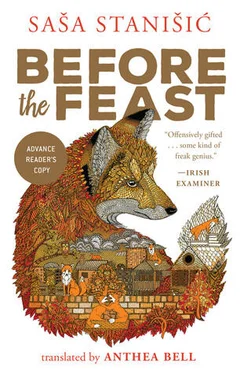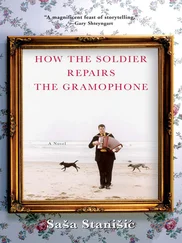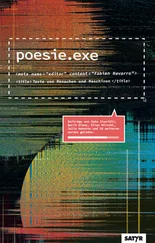Opening Times: strictly observed.
The Leitz file folders contain documents on:
People and personalities
History I (1740–1939) and History II ( 1945–1989 )
Present events I (1990–onward, in progress)
Trade, arts and crafts over the ages
Festivals, customs, clubs
Faith, the church (bells), war
Tales and legends ( I, II, III )
We don’t take any historical interest in the contents of the Leitz file folders.
Above the folders hangs a cork pinboard. Pinned to it are index cards with accounts of milestones in local history. The first is about a giant:
It was not men who divided the waters at Fürstenfelde in such a way that we have two lakes; a giant did it. Long, long ago he broke the peak off a mountain in the Dinaric Alps in Dalmatia, and threw it so that it landed here and divided the waters for ever. History does not relate whether the giant threw the mountain peak on purpose .
They tell this story in the Dinaric Alps too. A mountain peak, as they tell it there, was blocking a giant’s view of the Adriatic Sea, so he got rid of it. That version doesn’t say that the rock traveled all the way to the Uckermark. Anyway, there are huge fingerprints to be seen on it, and a worn inscription in Old Church Slavonic which could mean, “The love of God is our salvation,” or alternatively it may say, “Bogoljub (= Theophilus) is a stalk of asparagus.”
We don’t take any historical interest in giants.
We don’t take any interest in milestones of local history.
Anyone who takes a historical interest in us had better talk to Frau Schwermuth. Frau Schwermuth knows things. She knows where to find the dramatic story of our Singing Club in the Leitz file folders, with the tale of its rise and fall at the beginning of the war, and she knows where to find the equally dramatic story of our Marksmen’s Association and its rise and fall after the end of the war.
Farewell, brother marksmen, think of your old comrades sometimes, and we send you greetings: shoot well, and good luck!
Those are the words of Paul Wiese. Wiese was our chronicler until the 1950s. Frau Schwermuth has been his successor since the fall of the Berlin Wall. In between those years, the office of chronicler was neglected. Historically and in relation to Fürstenfelde, Frau Schwermuth knows everything, or she knows how to find it out.
We don’t take any historical interest in the Marksmen’s Association.
We don’t take any historical interest in knowledge.
The Homeland House sells secondhand books out of banana crates. We take no historical interest in them, but they’re El Dorado for dust mites. They cost between fifty cents and four euros. The journal Our Fürstenfelde , published by the Fürstenfelde Historical Society, costs five euros to local people and eight to tourists on cycling trips. The poster Fürstenfelde, Seen from a Helicopter (1996) cost fourteen D-Marks when it was published. The latest CD made by our Firefighters’ Choral Society, Sound and Smoke, We Didn’t Start the Fire , costs 7.89 euros. They were rehearsing Beethoven’s “Hymn to the Night” in the evening, for the Feast. It sounded good, very good. And assorted maps of the area can be bought at the Homeland House: walking and cycling maps, maps of the lakes, and four different picture postcards.
At the moment there’s an exhibition about tiled stoves in the Homeland House. Tiled stoves used to be our most important and beautiful exports. Another exhibition is also on, showing everyday items from the time of the German Democratic Republic: hair dryers, sewing machines, can-openers, what a People’s Police officer looked like, canned food, etc.
We don’t take any historical interest in tiles or everyday life in the GDR.
But we do take an interest in the massive wooden door in the cellar. There’s something about doors and cellars. Still intact, despite their age and the damp. We’re interested to know why so much fuss is made about that door. About the lock on that door. We take an interest in the room behind it. About six by six meters, asymmetrical walls of unhewn rock, more of a cave than a room. And during which war did old Lutz hide people in there?
We don’t take any interest in historical accuracy.
And we don’t know much about the room in the cellar. It’s some kind of local history archive. But our History Society keeps a low profile about what exactly is in that archive. Now that is interesting. It’s as if you were collecting something but not telling anyone what. So either you’re ashamed of it, because you’re a fifty-year-old engineer nicking and hoarding, let’s say, used tubes of lip gloss, or it’s forbidden to collect what you’re collecting, for instance because it’s threatened with extinction, like some species of monkeys and so on.
Members of the History Society, that’s to say the Committee of Friends of the Homeland House, are: Frau Kranz, Frau Schwermuth, Imboden, Zieschke the baker, the bell-ringer and, until recently, the ferryman. We’d know even less about the archive if Frau Schwermuth didn’t sometimes talk proudly about it, and if something wasn’t exhibited upstairs from time to time.
We first heard about it in 2011. Frau Schwermuth applied to the community, as represented by the Mayor Frau Zink, to authorize the purchase of an electronic lock for the massive wooden door and a device to regulate humidity in the cellar. There was talk of a “sensational historical find” that the History Society wanted to keep suitably safe and sound. Part of it was documents that wouldn’t even be regarded as lost because no one had known that they existed. Examination of them had apparently already begun, and it was hoped that the papers could soon be made accessible to the public and to scientific research. Frau Schwermuth called the archive then being set up the Archivarium.
The Mayor wasn’t the right person to apply to, but of course she turned up at once wanting to see the “sensational find.” Frau Schwermuth wouldn’t let her. Frau Zink was first amused and then upset to discover that it wasn’t a joke. Frau Schwermuth said she was sorry, but she couldn’t let just anyone in to see it. What did she mean, just anyone — and so on; Frau Zink was on the point of forgetting the dignity of her office, but then she asked to speak to the chairman of the committee, who was the ferryman at that time. They went into a room and talked privately for quite a long while. After that the community agreed to finance those two purchases.
The fact is that no catalog of the Archivarium exists, and to this day no public use for it has been found. Does the Museum of Brandenburg History know about the archive and the “sensational find,” and what does it think of them? From time to time Frau Schwermuth puts something on display in the glass case on the upper floor: an old lease, a marriage certificate. Or statistics: the quantities of fish caught in the year 1744, those from Fürstenfelde who died in this or that war.
In 1514 the feudal lord of the time, Poppo von Blankenburg, required four wethers a year from the shepherd appointed by the rural district council in consideration of his use of the meadows in Blankenburg’s possession.
We do take a little interest in the shepherd, but only because we like the idea of a shepherd appointed by the rural district council.
The Blankenburgs in general appeal to Frau Schwermuth as archivist: a document of a hundred years later records the purchase of an ox by the former feudal lord’s descendant, also Poppo von Blankenburg by name. Frau Schwermuth connected the record of the purchase with a letter of complaint about the sadly unedifying character of the said ox, rounding its story off with Blankenburg’s account of the truly remarkable end of the ox, which was driven to the Baltic and there fell from a cliff into the sea, history does not relate whether of its own accord or not.
Читать дальше












